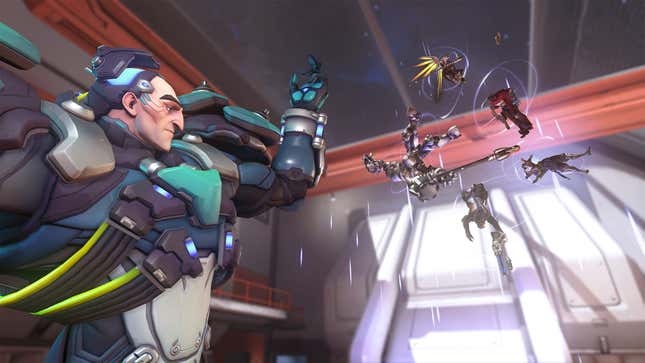
By this point, I would imagine that Overwatch director Jeff Kaplan is sick of talking about the meta. It’s a perennial topic among vocal portions of the Overwatch community and a near-constant source of consternation. The meta over-prioritizes certain heroes, say some people. It changes too slowly, say others, asking for MOBA-style solutions like hero picks and bans. Now Blizzard is overhauling how game balance works—including temporarily disabling some heroes—to keep the meta moving as fast as a Tracer who’s about to be smooshed flat by a Reinhardt.
In a new developer update video, Kaplan—forever and for always “with the Overwatch team”—talks about how Overwatch has, over the years, faced criticism for a slow-moving meta. That, he said, is about to change thanks to a smattering of new initiatives. For one, the game will soon gain a new “card” alongside quick play, competitive, and the match browser: “experimental.” It’ll focus on gameplay changes the development team wants to try out—things like balance shifts and new modes—and will be part of the main client, not the public test server. This means that anybody, even console players, can access it. “It should drive a lot more players to helping us test out changes,” said Kaplan.
This will be accompanied by a change in overall balance philosophy. Previously, said Kaplan, the team focused on “stability” within the ranks. Now, however, they’re going to “specifically” target the meta “more frequently, more aggressively.” The goal will be to move players “off the meta as frequently as possible.” If a series of balance changes prove themselves overly egregious, Kaplan added that the team will not be afraid to revert them “a few weeks later.”
On top of that, Overwatch is adding hero pools to the game’s competitive mode. Hero pools, said Kaplan, will function like map pools, but, you know, for heroes. Beginning in March, a selection of heroes will be disabled from play for one week at a time. It will not be random, but rather, decided on by the design team. Kaplan offered Orisa, Sigma, Mei, and Moira as a definitely-off-the-top-of-his-head and not at all hyper-targeted example. The goal of this system is to “keep the meta fluid” and encourage “more hero diversity.”
Overwatch League will also incorporate a version of hero pools, which Blizzard explained further in a blog post. Beginning on March 7, the league will scratch one tank, one support, and two damage heroes from the roster each week. “The heroes will be randomly selected from a group of eligible heroes based on play-rate data from the previous two weeks of Overwatch League matches—only heroes that are being played regularly can be pulled from the next hero pool,” wrote Blizzard. This will certainly keep teams on their toes, but it also means that players will have to do even more work—on top of an already grueling practice schedule and season three’s addition of travel—to stay ahead of the curve.
Kaplan was quick to chalk meta changes up to player feedback, which makes sense, given that players have never, ever, ever liked a meta—except, of course, the one that came before whichever one is currently in vogue. It’s worth noting, however, that Kaplan is singing a very different tune on this subject than he used to. Just last week, he acknowledged on Overwatch’s forums that “the vast majority of players only experience the meta through [the Overwatch League],” and in an interview last year, he talked about how some people will always hate the current meta, no matter what form it takes. Now, though, he’s all about focusing the development team’s balancing efforts on it—and not, theoretically, on balance changes that would more directly impact the majority of players—and ensuring that it shifts as frequently as possible. This continues a long-running trend of balance changes that favor a vocal, competitive minority over the wider audience Overwatch initially tried to attract through messaging around accessibility and mechanics that went beyond traditional FPS fare.
Maybe if the meta is changing every week, people won’t have time to get mad? If nothing else, this promises to be interesting, and when a game’s been around for nearly four years and countless people have fallen off the wagon, sometimes you just need to shake things up.